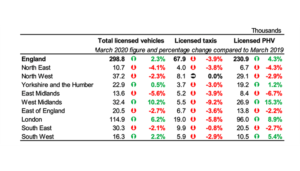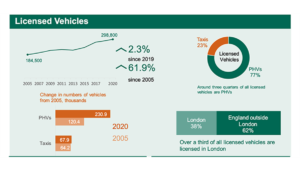Taxi and private hire industry have gone through various turmoil’s in recent times, from the pandemic that impacted us all, reputation of the industry and the impact from unlicensed drivers and unethical firms such as Uber operating within our areas without any safeguards for the industry, and for the public that is the bread and butter of all of us who work hard every day for ourselves, our families and for the people we work for.
But in all this, what about the consumer? What about our own members of the team? What have or are we doing to protect and safeguard them from the dangers that exist?
Vulnerability doesn’t just associate itself to young, elderly or the in between. It affects us all, no matter the circumstance is at risk if appropriate steps are not in place.
So, what do we do?
| There were an estimated 171,000 drivers operating in England during 2019/20, which is 20% lower than 2018/19 (214,000) and 12.0% lower than ten years ago (194,000 in 2009/10).
In 2020, 83 licensing authorities (29%) applied a limit on the numbers of licensed taxis, with a further 4 setting limits in some, but not all, of the areas they cover. This is a slight decrease from 30% of licensing authorities that applied a limit in 2019. Of those licensing authorities with a limit on the numbers of taxis, 4 licensing authorities (5%) have changed that limit in the last year. 57 licensing authorities (69% of those with a limit) have conducted an unmet demand survey within the last five years. The limits only apply to taxis and not to PHV. The West Midlands was the regions with the highest increase in licensed vehicles (both Taxi and PH) (10.2%), a higher percentage increase than London (6.2%). The North East saw the highest decrease in licensed vehicles, having lost 4% of their 2019 total. https://www.cordic.com/updates/taxi-and-private-hire-vehicle-statistics-england-2020 |


https://www.cordic.com/updates/taxi-and-private-hire-vehicle-statistics-england-2020
Various councils across the country now, for example in the Borough of Poole are taking steps and making it compulsory for all the taxi and private hire industry affiliates to set up new mandatory training courses to help protect the most vulnerable people within the local community.
These training courses will cover and detail the safeguarding, disability awareness and how to support people with vulnerability. It must acknowledge and focus on mental health, child sexual exploitation, sexual harassment and much more.
In the Borough of Poole, all new taxi and private hire drivers will be required to successfully undertake the training course before being granted a licence. There is also a programme or there must be one in place to ensure all existing drivers will have received the training and for the training to be repeated every 3 years. (www.poole.gov.uk.)
Councillor John Rampton, Cabinet Portfolio Holder for Licensing, Borough of Poole in January 2020, said: “Taxi drivers are the eyes and ears in our town and as such may spot behaviour or patterns that need to be reported to the authorities. As well as covering safeguarding, the training also deals with a range of conditions and disabilities that passengers may have and how drivers can recognise and deal with these. This will result in an improved taxi and private hire service for everyone in Poole.”
This is not like the old days when times were different. In today’s world we have rules, we have laws, we have standards, and we have an obligated responsibility as whole to make sure that any form of vulnerability, whether it be internally within the firms or in the open public, that all people must be safeguarded.
Taxi firms and its drivers depend on the reputation of how it operates. Rhianon Greenslade, Sexual Violence Prevention Officer, Safer Poole Partnership, added: “Taxi drivers could provide that missing jigsaw piece of information that the Police or social care teams need to take action. We know that taxi drivers witness various incidents that may appear concerning, so by working together we can safeguard those most at risk in our community.”
In London, Sadiq Khan, Mayor of London, has confirmed the introduction of safeguarding training for Transport for London (TfL) licensed drivers and applicants.
The mayor was responding to a question from Liberal Democrat Caroline Pidgeon who asked whether “TfL considered offering training to taxi and private hire drivers to help identify and support the reporting of violence against women?”
Mr Khan said “In addition to safeguarding communications already issued to licensees, Transport for London plans to introduce a number of additional training modules to taxi and private hire drivers later this year. This includes an interactive online presentation focused on safeguarding and the role licensees can play in keeping their passengers, including women, children, young people and vulnerable adults, safe.”
Why training?
In July of this year the Department for Transport issued statutory guidance for councils including TfL. The new guidance states:
All licensing authorities should provide safeguarding advice and guidance to the trade and should require taxi and private hire vehicle drivers to undertake safeguarding training.
This is often produced in conjunction with the police and other agencies. These programmes have been developed to help drivers and operators:
- provide a safe and suitable service to vulnerable passengers of all ages.
- recognise what makes a person vulnerable; and
- understand how to respond, including how to report safeguarding concerns and where to get advice.
It is not clear at this stage, although only an assumption, that this training will be mandatory for existing licence holders but also a mandatory requirement for all new applicants.
Department for Transport did state that “We have extensively written about TfL’s fit and proper (or character) requirements. The safeguarding training is likely to form part of TfL’s fit and proper requirements. In other words, it is likely to become a requirement for getting a licence”.
Better policies, better structure and better training is the key to a better tomorrow. We all say it, we have a shortage of drivers, don’t have time to train our staff, rival firms take more business, but why? The answer is not always simple, you must dig deeper and find the reasons why.
With many changes coming into the Private Hire Industry its time to act and therefore Safety as a Standard (SaaS) is the key implement for firms and their respective drivers to educate, invest, build your brand, and build strong community relations focused on safety and awareness.
Safety as a Standard training routes are not just a generic overview. All courses focus in-depth of the key components in areas of mental health, sexual harassment, health and safety, child sexual exploitation and much more making each subject matter an integral investment for anyone or any firm to broaden and support safety standards in the private hire industry.
The SaaS membership route programme starts from a little as £1 per month for the drivers along with the option of corporate memberships, especially bespoke services structured to each firms needs, it is the future gold standard, for the market today and tomorrow.
Everybody in the private hire industry can change. Start investing in structured training that gives you the tools in safeguarding, driver retention, driver employment, community awareness, positive community relations and much more.
I believe in SaaS and in their professional approach and I wasn’t the only one, and evidence of this was when I visited the PHTM EXPO 2021 in Milton Keynes and talked about SaaS to various fleet owners and directors, they all said that ‘the Industry needs someone like SaaS to help and understand subject matter like sexual harassment and mental health which are all major topics in today’s industry, firms need to act today to safeguard its network of drivers and the community’.
Safety as a Standard membership programmes are relatable to all, but it is up you as an owner, as a driver to believe in the importance of safety standards in joining the network of people who are already making a difference to the industry for a better tomorrow.


